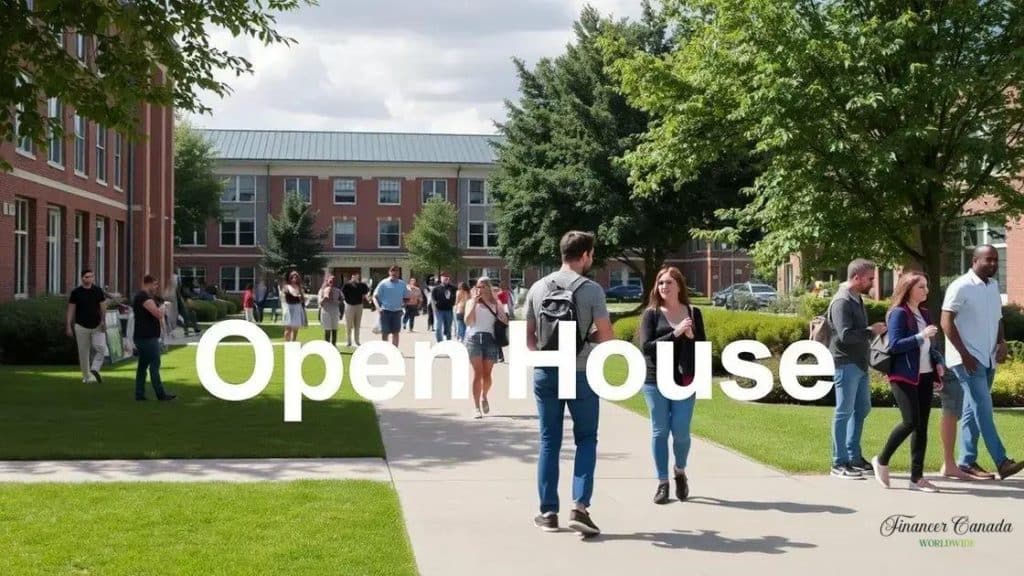Changes in college admissions in the post-pandemic world

Changes in college admissions in the post-pandemic world include the adoption of digital marketing strategies, a holistic review process, personalized communication, and evolving acceptance criteria that focus on students’ diverse backgrounds and experiences.
Changes in college admissions in the post-pandemic world have brought notable transformations. With new challenges on the horizon, it’s worth pondering how these shifts affect students and institutions alike.
Impact of remote learning on admissions
The impact of remote learning on admissions is significant and continues to resonate throughout educational institutions. As students adapted to online classes, admissions offices had to rethink their strategies to reach prospective students.
Changes in Application Submissions
With remote learning, students are submitting applications more than ever. This change stems from the accessibility of virtual college tours and information sessions. Institutions can now reach a wider audience.
- Increased submission rates due to convenience
- Broader reach for schools targeting diverse populations
- Virtual options allow for more flexible application processes
Furthermore, remote learning has changed the way students engage with their potential schools. Virtual platforms have made it easier to organize information sessions and Q&A events. These sessions provide opportunities for students to ask questions that might influence their decisions.
Adapting Admissions Criteria
Admissions committees are adapting to the challenges posed by remote learning. This involves considering how a student’s remote experience might affect their academic performance. For example, many schools are now looking at factors such as:
- Student engagement in online classes
- The types of projects completed during remote learning
- Additional skills gained through self-directed learning
The changing landscape of remote education also impacts the assessment of standardized tests. Some institutions have chosen to go test-optional as they evaluate how effectively exams measure a student’s readiness amid varied learning experiences.
As remote learning becomes more mainstream, the implications for college admissions will likely continue to evolve. Schools are now more aware of the diverse challenges students face and are adjusting their expectations accordingly.
Shifts in application processes

The shifts in application processes have become evident as colleges adapt to the changing educational landscape. With the rise of online submissions, many institutions have streamlined their application systems. This evolution aims to make the process simpler and more accessible for prospective students.
Introduction of Digital Platforms
Students now primarily use digital platforms for their applications. These platforms not only ease the submission process but also allow for instant feedback and communication.
- Real-time updates on application status
- Easy access to required documents
- Enhanced communication with admissions staff
The use of technology has revolutionized how students interact with colleges. Virtual interviews have also become more common, enabling students to connect with admissions officers from the comfort of their homes. This offers a unique opportunity to showcase personality and interest.
Flexible Deadlines and Holistic Review
Many colleges have adopted more flexible deadlines due to the pandemic. This approach helps to accommodate the varied circumstances students face. A holistic review process, focusing on various aspects of a student’s application rather than just grades, has gained traction.
- Consideration of personal experiences and challenges
- Emphasis on essays and recommendation letters
- Inclusion of extracurricular activities and leadership roles
As this shift continues, colleges strive to create more inclusive environments. By adjusting their application processes, they can better reflect the diverse backgrounds and experiences of applicants.
Evolving criteria for acceptance
The evolving criteria for acceptance at colleges have shifted dramatically in recent years. As institutions seek to create more diverse and inclusive environments, they are reevaluating how they assess applicants. This evolution reflects a broader understanding of what makes a successful student.
Shifts in Academic Standards
Traditionally, grades and test scores dominated the admissions process. However, schools are increasingly recognizing that these factors don’t tell the whole story. In response, many colleges are adopting a more holistic approach.
- Considering personal background and challenges
- Valuing letters of recommendation and essays
- Focusing on a student’s potential and character
This shift allows admissions committees to understand the complete narrative of an applicant. For example, students who have faced obstacles may demonstrate resilience and determination, qualities that are crucial for success in college.
Inclusion of Extracurricular Activities
Another important change is the increased emphasis on extracurricular activities. Colleges want to see how students engage with their communities and pursue their passions outside the classroom. Extracurriculars offer insights into a student’s interests and commitments.
- Participation in clubs and sports
- Volunteer work and community service
- Leadership roles in various activities
This broader evaluation means that students can shine in ways that traditional metrics might overlook. As admissions processes continue to evolve, students are encouraged to showcase their unique talents and experiences.
Influence of standardized testing

The influence of standardized testing on college admissions has been a topic of extensive debate. For many years, standardized tests like the SAT and ACT played a crucial role in how schools evaluated applicants. However, perceptions and policies surrounding these tests are evolving.
Changing Perspectives on Test Scores
Many colleges are starting to question the weight given to standardized test scores. Research indicates that these tests may not accurately reflect a student’s potential for success in college. As a result, some institutions have adopted test-optional policies.
- Students can choose whether to submit scores
- Focus shifts to other criteria like GPA, essays, and recommendations
- Encouragement of a broader range of applicants
By moving away from a strict reliance on test scores, colleges aim to foster a more inclusive admissions environment. This shift also allows students from various backgrounds to have a fair chance in the application process.
Impact on Student Preparation
With the decreasing emphasis on standardized tests, students are adjusting their preparation strategies. Instead of focusing solely on test scores, many are dedicating more time to developing skills that colleges now prioritize.
- Enhanced focus on coursework and grades
- Emphasis on extracurricular involvement and community service
- Strengthening personal essays to showcase unique stories
This adjustment not only enriches the overall application experience but also encourages students to present themselves in a more holistic manner. Ultimately, the influence of standardized testing is shifting, opening doors to a more equitable admissions process that values diverse experiences and capabilities.
Trends in student recruitment strategies
The trends in student recruitment strategies have undergone significant changes in recent years. As the competition among colleges intensifies, institutions are adapting their approaches to attract prospective students. This evolution has made recruitment more dynamic and innovative.
Utilization of Digital Marketing
Digital marketing has become a cornerstone of student recruitment. Colleges are leveraging social media, email campaigns, and online advertising to reach young audiences effectively. This shift allows schools to connect with students where they spend most of their time—online.
- Engaging content on platforms like Instagram and TikTok
- Targeted ads based on student interests and behaviors
- Interactive virtual tours and webinars
By creating an engaging online presence, colleges can showcase their campus culture and academic offerings. These strategies help potential applicants feel more connected to the institutions.
Emphasis on Personalization
Another important trend is the move towards more personalized recruitment. Schools are tailoring their communication based on specific interests and needs of prospective students. This creates a more tailored experience that can make a lasting impression.
- Customized emails that reflect individual interests
- Personalized follow-up from admissions staff
- Opportunities to connect with current students and alumni
This focus on personalization helps students see how they would fit within the college community. Moreover, it builds a stronger relationship between students and admissions teams, making recruitment feel more friendly and less transactional.
As trends continue to evolve, colleges are finding new and effective ways to recruit students. The combination of digital strategies and personalized outreach is setting a new standard for how institutions attract talent.
FAQ – Questions about Changes in College Admissions
How have digital marketing strategies changed college recruitment?
Colleges are now using social media and online ads to engage potential students, making recruitment more accessible and interactive.
What does a holistic review process entail?
A holistic review process considers the entire student profile, including grades, experiences, and personal qualities, not just standardized test scores.
How are colleges personalizing their communication with applicants?
Colleges are tailoring their messages based on individual student interests and needs, creating a more engaging and personalized recruitment experience.
What trends are emerging in admissions criteria?
There is a growing focus on diversifying acceptance criteria to reflect students’ backgrounds and potential, moving away from a heavy reliance on test scores.





